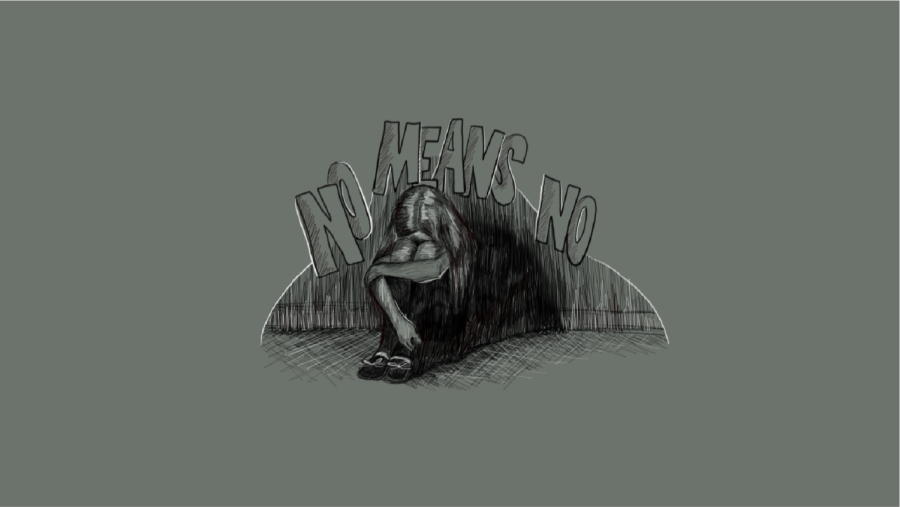Cushman: Utah Needs to Address Misogyny to Stop Sexual Assault
(Graphic by Storey McDonald | The Daily Utah Chronicle)
September 27, 2022
In Utah, most violent crime is perpetrated at rates significantly lower than the national average. The same cannot be said for rape, where we have higher rates than the national average and one in six women experience rape or attempted rape in their lifetime. Sexual assault is a health and safety crisis in our state. To address and combat it, we first need to address the issue of rampant sexism fueling it.
Sexism in Utah
Growing up and now attending college in Utah, I’ve experienced sexism firsthand. I’ve felt pressure to embrace traditional female gender roles and had my intelligence demeaned by men in my life. Sexism isn’t limited to my experiences though. For the fifth year in a row, Utah has ranked as the worst state for women’s equality. Women own less businesses and hold fewer executive positions. Women are more likely to live below the poverty line and our state has a large gender pay gap.
The sexism Utah women experience goes beyond economic disparities. A 2020 study found that sexist comments are “prevalent” and “normalized” in our state. In workplaces, churches, homes and communities, we hear demeaning sentiments about our gender. We get told that we’re less than and excluded from opportunities and positions of power.
Sexism has become ingrained in us. Utah is one of only a few states where women demonstrated more sexism than men when responding to misogynistic comments in a nationwide questionnaire. Women respond to misogyny by minimizing and internalizing it as a way to protect ourselves from a culture that diminishes us. Misogyny not only keeps women from positions of power and reinforces negative stereotypes, but it also contributes to the major problem of sexual violence against women in our state.
Sexism and Rape Culture
Rape culture exists when sexual violence is prevalent, normalized and excused. We perpetuate rape culture when we trivialize sexual violence and act misogynistic. I’ve had an ex-partner try to initiate sex with me after I’d said “no.” When I shared the experience with a loved one, they asked if it was “as a joke or as a come on?” That response didn’t have malintent, but it minimized the assault I experienced, nonetheless. It implied that if a joke makes a woman feel violated, it doesn’t matter. That’s rape culture.
Misogyny creates a foundation for rape culture. For instance, Utah’s religious norms and education promote sexual purity and abstinence. These beliefs tell women how to dress and act to stop male temptation and lust. This creates the myth that if women do as they’re told, they won’t be raped. It creates a toxic environment where we take victims less seriously if they don’t dress or behave the way sexist norms dictate they should. It allows us to punish women who enjoy sex by assuming that saying “yes” to a sexual activity at one point means they wouldn’t say “no” in another situation or at another time.
Ideas about sexual purity force the responsibility and consequences for male sexual desire onto women. It tells women they must keep themselves safe from sexual assault and puts the burden on them when they fail. Kidnapping and sexual assault survivor Elizabeth Smart has spoken out about how her LDS faith helped her get through her captivity, but says that at the same time, the church’s beliefs about sexual purity made her feel worthless in the aftermath of repeated rapes by her kidnapper. Because her worth as a woman was linked to her purity, she felt ashamed and unwanted.
Looking beyond this example to sexism as a whole, we can see it as a means of controlling women and taking their choices away. From comments telling women they should fulfill traditional gender roles to gender pay gaps that minimize the financial autonomy of women, sexism in Utah minimizes women’s power. When our culture says female autonomy doesn’t matter, that attitude becomes widespread and sexual assault thrives.
Utah’s Sexual Assault Problem
Sexual assault in Utah creates a host of problems. Rape survivors experience a multitude of adverse health effects — from depression and anxiety to physical health consequences to PTSD. All Utahns share the high monetary cost of sexual assault. In 2011 alone, the state spent $5 billion on sexual violence related costs, equaling about $1700 per Utah resident. We all share the costs of sexual assault and so we must all share the burden to stop it.
We can’t expect Utah’s high sexual assault rates to decrease until we address the misogyny and rape culture that minimizes sexual assault and survivors. We need to confront rape culture when we see it and educate our peers. And importantly, we need to fight for better education for Utah children so they value women, their autonomy and consent.
Sexual violence is a health crisis because of how many Utah women it affects. It’s a disaster because it costs Utahns so much money. But most of all it matters because sexual violence doesn’t just affect victims or taxpayer wallets. It matters because you know someone who has experienced sexual violence. I know someone who has experienced sexual violence. I want that to change. Utah women need to be safe from sexual violence. To do that, we need to address sexism.








